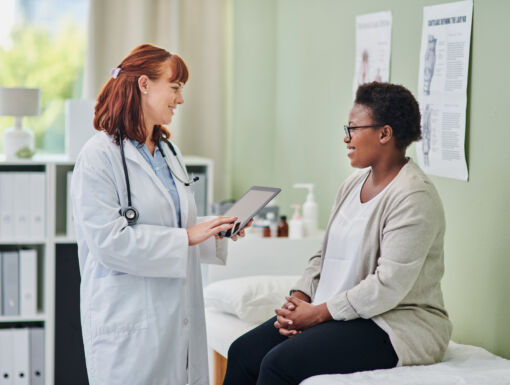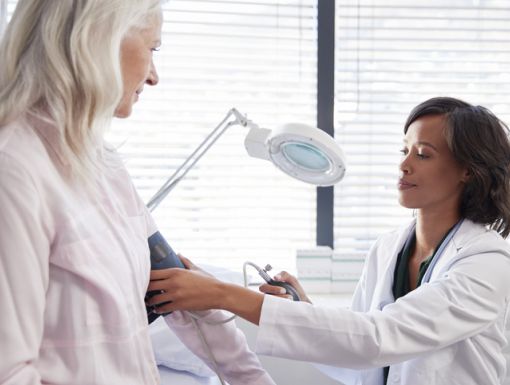
What Are Symptoms for Polycystic Ovary Syndrome?
September is Polycystic Ovary Syndrome (PCOS) Awareness Month, and it is an important topic, because PCOS affects 1 in 10 women. PCOS is a disorder that causes hormonal, metabolic and reproductive imbalances. While PCOS can affect your overall health, appearance and fertility, there are treatment options your gynecologist can offer.
What is PCOS?
PCOS can create hormonal imbalances, preventing your ovaries from developing a mature egg for fertilization during the time of ovulation. It can also cause women to have irregular periods or even miss their periods altogether. When a woman misses her period, multiple cysts may form on her ovaries because no dominant follicle, which is the follicle that enlarges to release an egg during a menstrual cycle, develops. This can lead to infertility. It is estimated that between 10%-15% of women have PCOS. Additionally, 50% of women with PCOS are not diagnosed. It usually isn’t until women are ready to start having children that it may be discovered, due to their fertility concerns. Common symptoms of PCOS include:
- Irregular periods – Some women may stop having menstrual periods, while others might have fewer periods
- Excess facial and body hair
- Severe acne
- Small cysts in ovaries
- Insulin resistance
- Anxiety and depression
- Infertility
- Increased weight gain or difficulty losing weight
- Thinning of the hair
While the reasons a woman develops PCOS are not fully known, there are a few factors that experts think contribute to PCOS. Genetics plays a role. Women who have a mother, sister or aunt with PCOS are more likely to have PCOS themselves. Women with PCOS also tend to have higher levels of androgens, which are the sexual and reproductive hormones in males that are responsible for growth, voice change and developing body hair. These higher levels of androgens can cause a women’s egg to not be released during their menstrual cycle. It can also cause an increase in acne and body hair.
Women with PCOS might also have higher levels of insulin, a hormone that regulates the amount of glucose, or sugar, that is in the blood. Often, women with PCOS have higher levels of sugar in their blood, despite large doses of insulin being produced. Many times, it is due to a dysfunctional insulin receptor. The higher levels of insulin may cause them to become insulin resistant, which can lead to type 2 diabetes.
How is PCOS diagnosed?
PCOS can be diagnosed by your gynecologist, or possibly your endocrinologist, through a variety of tests, including:
- Blood tests, which will check your androgen levels, along with other hormone levels such as your pituitary levels, ovarian hormones, stores of sugar in your blood and thyroid levels.
- Pelvic ultrasound, which is used to see if your ovaries have developed multiple cysts on them.
- Clinical signs and symptoms discussed during consultation and exam in the office
How is PCOS treated?
While there is no cure for PCOS, your gynecologist can develop a plan to help manage the symptoms. For women who don’t wish to be pregnant and have cysts on their ovaries or have irregular periods, your doctor will consider hormonal options such as progesterone or birth control. This will help regulate your period and will reduce the formation of cysts. It can also help with acne, decrease facial hair and reduce your risk of endometrial cancer. If your androgen levels are high, your doctor may also prescribe medication to block the effects. However, these drugs do not help treat PCOS and may cause pregnancy issues.
If you have PCOS and wish to become pregnant, you doctor may recommend a few options to increase your chances of fertility:
- Lose weight – For women who are overweight or obese, losing weight may help their periods become more regular, increasing fertility. To lose weight, incorporate a healthy diet and 30 minutes of exercise into your daily routine.
- Medication – Your OB/GYN can prescribe medication that may help you ovulate.
- Supplements, such as zinc, primrose oil, prenatal vitamins and cinnamon bark, to name a few
- In vitro fertilization (IVF) – If the medication that is prescribed does not work, another option is IVF, where your eggs are extracted and then fertilized with your partner’s sperm in a lab. The fertilized egg is then implanted back in your uterus.
Women who have PCOS and become pregnant have higher rates of miscarriages, gestational diabetes, preeclampsia, a pregnancy disorder characterized by high blood pressure, and cesarean sections. It is recommended to work at achieving a healthy weight and having a healthy blood sugar level when you are planning to get pregnant. Your doctor may also recommend taking folic acid during your pregnancy to lower the risks of defects in development of your baby.
Our women’s services team is here to care for you. If you are experiencing irregular periods or are ready to take the next steps to become pregnant, schedule an appointment with one of our physicians.
.
-d10df263c2.jpg)

